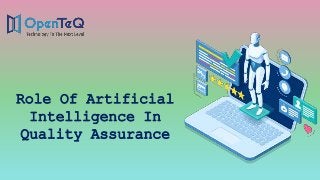
Role Of Artificial Intelligence In Quality Assurance (2).pptx
- 1. Role Of Artificial Intelligence In Quality Assurance
- 2. OpenTeQTechnologies Copyrights©2021 Allrights reserved Artificial Intelligence Quality Assurance, Role of Artificial Intelligence in Quality Assurance Digital transformation is the norm across industries today and software development is an inseparable part of business operations. This means the adoption of Agile frameworks and DevOps to deliver glitch-free codes rapidly. Quality Assurance (QA) plays a pivotal role in this activity and cannot be overlooked by organizations. The challenge is to change the way QA strategy is looked at and acknowledge the role of artificial intelligence in quality assurance. AI helps QA teams keep up with the pace of development and become more efficient and accurate in their testing. Introduction
- 3. OpenTeQ Technologies Copyrights©2021 Allrights reserved The main aim of QA is to ensure that the developed software meets expected specifications and performs the desired tasks without any issues. QA teams identify any possible bugs in the program through comprehensive testing. Based on this DevOps teams can improve on those parameters to deliver software that is functional, reliable, usable, efficient and maintainable. QA helps in detecting problems before the product reaches the customer or the end-user. This enhances customer experience and results in improved customer satisfaction. Robust QA practices also have an impact on software development costs with early bug discovery and reduced debugging efforts. The purpose of QA
- 4. OpenTeQ Technologies Copyrights©2021 Allrights reserved Automation is emerging as the business mantra for all types of organizational workflows, including QA. The role of artificial intelligence in quality assurance is to attain wider test coverage, optimize testing and present more predictable results and prevent defects rather than just detect them. Artificial Intelligence Quality Assurance
- 5. OpenTeQ Technologies Copyrights©2021 Allrights reserved Optimization of Testing Organizations are dealing with large amounts of data as code that needs to be carefully reviewed in the QA process. With manual testing, there is a possibility to make an inference based on the performance of the software, which may or may not be true. Artificial Intelligence and Machine Learning help in rapidly scanning the code to create test cases based on changes in functionality and requirements. This helps in the avoidance of failures that may occur with an incorrect judgment. AI will not only help in identifying the problem accurately but also give possible directions for improvement, thus optimizing the QA process. This aids QA engineers in making informed decisions and realizing optimal value and efficiency from the QA efforts.
- 6. OpenTeQ Technologies Copyrights©2021 Allrights reserved Escaping the Test Automation Trap There is no denying the fact that QA is essential to software development. It is an indispensable part that comes at the cost of time and resources. In a bid to deliver the best version of the product, manual QA testing becomes a time- consuming activity. This is to such an extent that by the time testing is completed, the requirements of the application have evolved due to changes in business functionality or UI. This means that the entire QA effort has been wasted and the process needs to be repeated according to the new requirements. This is the Test Automation Trap which can be overcome with the help of Artificial Intelligence Quality Assurance. AI helps in accelerating manual testing and even prioritizing test cases to ensure faster turnaround times.
- 7. OpenTeQ Technologies Copyrights©2021 Allrights reserved How Artificial Intelligence Quality Assurance is different AI, by nature, is constantly evolving and must be monitored especially in QA applications. The work of QA teams is not completed simply by implementing all the AI stages, presenting the bot with some training data and forgetting about the testing. QA teams need to be involved to build AI that is consistent and accurate. It needs to be validated through manual QA and testing at strategic intervals in the product lifecycle. As the role of artificial intelligence in quality assurance expands, there is a need to test the AI as well so that they continue to deliver business benefits at scale.
- 8. OpenTeQ Technologies Copyrights©2021 Allrights reserved Summing up The application of AI has grown by leaps and bounds in recent years. Though its applications in QA are still picking up, there is a huge potential for businesses to employ artificial intelligence quality assurance in their development workflows for increasing productivity, enhancing efficiency, delivering accurate and consistent results. The self-learning capabilities of AI can be leveraged to reduce QA effort and time if managed intelligently. The future of testing is autonomous and will soon be an integral part of QA strategies for all types of development activities.
- 9. Contact Us OpenTeQ Technologies Copyrights©2021 Allrights reserved Email: info@openteqgroup.com Mobile: +91 7032254999 (India) +1-602 806 4634 (US & Canada)
- 10. Thank You! OpenTeQ Technologies Copyrights©2021 Allrights reserved Thank You! Thank You Thank You Thank You Thank You Thank You Thank you Thank You Thank You